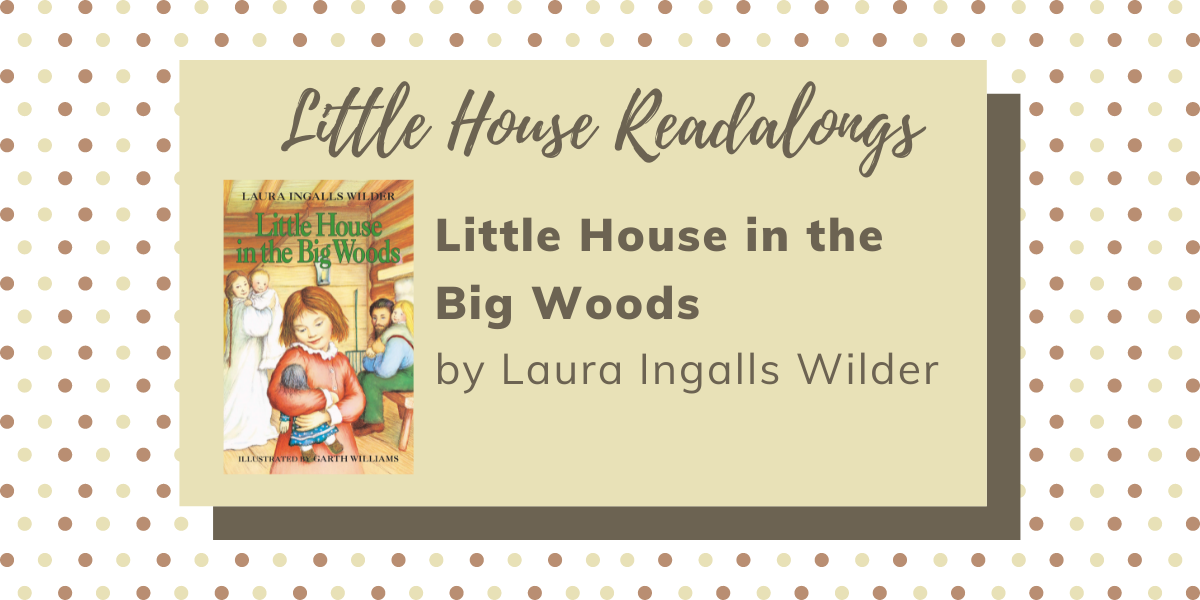
We wake up to find the cozy tunnel gone, the snowdrifts scoured (again with that word, which I didn’t realize how evocative it was until Wendy brought it up) down to the bare ground.
We also find out it is the middle of February. (Ma answers the question that Laura asks “stupidly.”) Just two chapters ago we learned the train wasn’t going to come at all; that was in January. Since then the family has been subsisting on brown bread and potatoes and warming themselves with quick-burning hay fires.
Now things are getting raw. Laura deigns to interpret a remonstration from Ma (“Never complain of what you have. Always remember you are fortunate to have it”) as an indicator that the family might … starve? No, Ma tells her. If the family has to, they’ll kill and eat the stock. She shushes Laura who audibly protests; the girls are coming downstairs.
Pa goes to Fuller’s and comes back with a rumor: a settler south of town (“18 or 20 miles southeast of here”) has wheat. Foster, that troublemaking rascal, is behind the rumor. But it just might be true. Pa bandies about the idea of trying to find the guy—
–NO. Ma says, quite simply, not just no but hell no. Surprised by her intensity, Pa tries to talk to her but she’ll hear no more about it. Now comes my favorite use of italics in the series:
You don’t go hunting for that wheat.
Italics usually imply emphasis. Sometimes they represent volume. These italics indicate neither of these. It’s just Ma: “She was quiet but she was terrible.”
As a parent, I often long for Ma’s mastery of quiet and terrible.
Pa accepts her answer. He has no choice. But Ma’s outburst has rattled her; she spills the tea she’s pouring for Pa.
After doing the chores Pa inquires about the state of the wheat and the potatoes. Inside the folded-over, nearly empty sack, there’s wheat enough for the breakfast bread, and only six potatoes remain. Pa asks for the milk pail. (Why doesn’t he know where the milk pail is?)
Now we’re down the street at Royal and Almanzo’s where they’re devouring another stack of ’Manzo’s famous pancakes. When Pa comes to the door they’re excited to see another human being, greeting him with fervor and offering him pancakes. Pa declines and asks about wheat to sell. Royal says they’re sold out and says hey, have some pancakes anyway. Pa ignores him and steps over to the wall, removes the saddle and pulls the plug to fill his milk pail with wheat kernels. Almanzo is astounded and mightily protests as Pa calmly continues; Royal is amused, tipping “his chair back against the wall,” hands in his pockets, grinning at his brother.
When the pail’s full, “Pa thrust the plug into the hole.” Oh dear. Where’s Ann Romines when you need her?
Pa calmly explains to a dumbfounded Almanzo how he did the math and decided the inside of the room didn’t fit the outside. “I figured you had grain there. It’s the only thing likely to run out of knothole.”
Talk of Almanzo’s seed wheat leads to a discussion of the phantom wheat in some settler’s shanty outside town. Royal tells Pa he shouldn’t go: “Who’d take care of your folks if you got caught in a storm and …” – I love this, how he talks with an ellipsis – “got delayed or anything?”
Pa puts that aside and asks again for a price on his pailful of wheat. Almanzo tries to give it away, which Pa refuses. They settle on a quarter.
Then they all sit down to pancakes and sugar-cured ham. I was surprised to read how many of you thought Pa was being selfish eating the pancakes while his family was down the road, starving. I’ve always been relieved reading this, knowing that Pa is getting such a good meal. He worked so hard in such physically demanding conditions to provide for his family, all day, every day, and I’ve always been heartened to think of this extra nutrition he got to help him along. Thank you, Wilder boys!
Pa makes it home just as the next blizzard strikes. He shows Ma the wheat and she gratefully and wondrously strokes the kernels (calling to mind, for me, the baby chicks she strokes in the dark in Little Town). Pa tells her he can’t say where he got it, but “there’s more where that came from.”
Imagine Laura Wilder, over seventy years old, writing about her nineteen-year-old future husband’s wheat saving her family from starvation. (Or at least from killing their stock.) How much of the drama was real? How much was manufactured to fit comfortably into the story? We’ll never know, but I like the idea of her ruminating over this and deciding what to share with the world about the man she loved—or the boy she fell in love with.


Comments13
Garth Williams’ depiction of Pa in this chapter was always haunting to me. The sunken cheeks and the way he was leaning against the wall. I was glad that he got another good meal. How could he keep on with his regular chores without it?
Fuller must have felt bad about the antelope, because he killed his cows, then perhaps did some thinking about the wheat? I don’t know.
I think Laura may have been worried the roof would actually get scoured through to a hole. But I am assuming her Pa knew there was plenty of roof left.
I think Pa wanted Ma to get the bucket for him?
I am not surprised about Pa not knowing where the milk pail was, as dairy work was traditionally “the woman’s” responsibility on the farm in the 18th and 19th centuries ~ especially in New England and New York. “The men” took care of the feeding of the livestock, wood and crops.
Hi, I just discovered this wonderful blog. I too am a huge fan of Laura Ingalls Wilder. I have not had the chance to visit any of the sites yet. In this chapter I am not suprised at how strongly Ma reacts. Pa was lost in a blizzard once before, and there is no protection on the open prairie. If he were to get lost he could not find a river bank to take shelter. I am going to get my copy of the book out,and follow along with the rest of the chapters!!
And let’s not forget this: without Pa, what would become of Ma and the girls? I feel Ma, as a wife, was mostly worried about HIS welfare; but you have to also be honest and realize that the family would have had a hard time existing without Pa in easier times; but during this winter, it would have been impossible. Where would they go? Travel to relatives was not an option, and the other families in town were barely able to provide for themselves, much less an additional five people. Perhaps the Boasts would have taken them in, but again, how would they get in touch with them?
I can’t stop thinking about the lack of vitamin C… how many months have to go by before you get scurvy? Does wheat have any vitamin C? I’m drinking a big glass of orange juice right now, feeling guilty.
Potatoes contain significant amounts of Vitamin C.
Deprived and restless for reading when it is -10° F with -30° windchill, I am rereading these great entries.
“Why doesn’t he know where the milk pail is?”
Pa asks for the milk pail because the cow has been dry for over two months (since before Christmas) so he is no longer using it on a daily basis. I would assume it is scrubbed and put away somewhere in the kitchen, which is Ma’s realm. The pail also might have been pressed into some other service, as when Ma bakes beans in the milk pans.
I can’t tell you how much I as homestead farmer, and someone who scrubs milk pails, appreciate how precise Laura is about all these homely details.
Idk where I mentioned this, but i predicted (and so did several others herein) that this winter was going to be a Long Winter.
Have they ever considered making a movie of the Long Winter?
There have been lots of attempts to get movies made from the books over the years and “The Long Winter” was singled out for a radio drama that ultimately started the De Smet Pageant. At present any such effort would have to work through Friendly Family Films who own the film rights for the entire series. As their last attempt at filming the series (the ABC mini-series) fared so poorly, I don’t think they’ll be trying again soon, but you never know.
I would think the Long Winter could be a dramatic movie – one of pioneering persistency etc.. This would be a 2 hr movie not a mini series.
I am so enjoying reading these readalongs. I too went looking for something to read during our last snowstorm and now it is just prior to the next one coming tomorrow/Monday. New England winters are hard but I don’t think they are as severe as Dakota winters! The Long Winter was my first introduction to Little House – my 5th grade teacher read us a chapter per day. From there I was hooked and still am (at age 52). I love imagining the warm, cozy feed store with the yummy food cooking. The closest I came to “roughing it” was in 2011 when we had our Halloween weekend blizzard which resulted in a 3-day long power outage where I live. We have a well and had no running water and used our fireplace for heat. My husband had a severely broken leg and our son was little at the time – my husband couldn’t bring in wood so I hauled it in – we were running out of it too. It was in the 40s in our living room by the fire by the time the power came back. I thought of Laura often and how much more they had to go through (although I will say one night I saw the stars in the sky more beautiful than I imagine I will ever see them again without the “light pollution”). In the end we were ok and it was an “adventure” but not one that I’d like to repeat. Please keep adding books/chapters to this site – it’s so enjoyable to read.
Comments are closed.